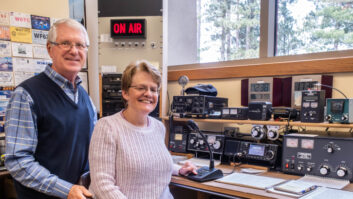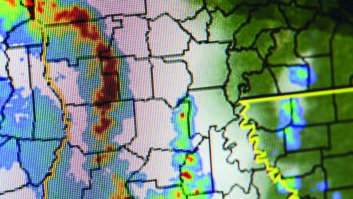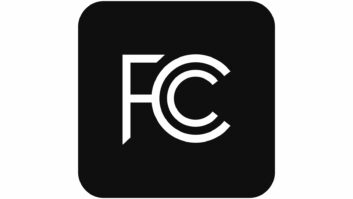WILMINGTON, Del. — The U.S. Patent and Trademark Office will reexamine two patents at the center of a legal dispute between radio broadcasters and a company claiming to own key automation technology.
Broadcast Electronics — which makes AudioVault products and is not a defendant in the patent infringement lawsuit — had asked for the review and received word in mid-September that the Patent Office had granted the request. A favorable finding could render the lawsuit moot, though that’s not assured.
Attorneys for the radio broadcasters involved in the litigation have requested a stay from the judge overseeing the case in U. S. District Court pending the patent review.

The website of Mission Abstract Data offers little to no clues as to who owns the company or is managing the legal fight.
Radio World also has confirmed that the plaintiff in the suit, Mission Abstract Data, previously was owned by Intellectual Ventures, a controversial patent holding company founded by former Microsoft Chief Technology Officer Nathan Myhrvold in 2000. Unclear is why that relationship changed or whether the change would affect the legal battle.
Stay likely
Mission Abstract Data, doing business as DigiMedia, claims it holds several patents for an all-digital, hard drive-based system able to store songs for music storage and playback for broadcast. The patents were issued to Robert J. Goldman in 1997 and another in 1998 (see sidebar).
Earlier this year Mission Abstract Data sued CBS Radio, Townsquare Media, Beasley Broadcasting, Cox Radio, Greater Media and Cumulus, which own approximately 900 stations in total, for patent infringement. Townsquare has since been dropped from the suit.
Bill Ragland, a patent attorney with Womble Carlyle Sandridge & Rice, said the Patent Office’s reexamination typically takes 2-1/2 years to determine patentability. Ragland, who is not involved in the suit, believes it is “highly possible” the judge in this case will grant a stay. He said that has been a trend among federal district courts over the last several years.
Ragland said BE may have become involved because it had sold systems to some of the defendants and was seeking to indemnify and defend them. Ray Miklius, vice president of studio systems for Broadcast Electronics, declined to comment on recent developments.
Several other automation manufacturers, including ENCO and OMT Technologies, also declined to discuss the patent infringement case. Among them is RCS, owned by Clear Channel Communications. Clear Channel owns more U.S. radio stations than any other group but is not named in the patent infringement suit.
A Clear Channel official told Radio World earlier that the company had not reached any settlement agreement with Mission Abstract Data; but Clear Channel representatives did not respond to subsequent requests for comment from Radio World.
Meanwhile, fewer stations appear to be affected by the case now. Townsquare Media, which owns 176 stations in 38 markets, was dismissed “with prejudice” from the lawsuit, meaning the plaintiffs can’t re-file against the broadcaster in the future, according to a document filed on July 25.
Mission Abstract Data Recap
Mission Abstract Data LLC, doing business as DigiMedia, filed the complaint in U.S. District Court for the District of Delaware in March 2011, alleging patent infringement by broadcast groups including CBS Radio, Beasley Broadcasting, Cox Radio, Greater Media and Cumulus. The count of radio stations owned by the companies involved totaled about 900 at one time (RW, June 1).
The defendants countersued DigiMedia in May, alleging the patents are not valid and seeking damages from DigiMedia.
DigiMedia’s suit, filed by Hagens Berman Sobol Shapiro LLC, identifies DigiMedia as holders of Patent No. 5,629,867 and Patent No. 5,809,246, which were applied for in 1994 and issued in 1997 to inventor Robert J. Goldman. The patents are titled “Selection and Retrieval of Music From a Digital Database” and describe a hard drive-based computer system for use by music radio stations.
According to a 1990s press release, Robert Goldman was a division president of Haltek America Inc., who went on to found GetMedia Inc. in 1997, a dot-com company that explored ways for consumers to download and buy music they heard broadcast on radio stations.
Hagens Berman Sobol Shapiro LLC, based in Seattle, calls itself “a consumer-rights class action” law firm on its website, interested in protecting the rights of investors, consumers, innovators and the environment. It has previously filed class action suits against Apple, Verizon and Capital One and is involved in the ongoing Toyota sudden unintended acceleration litigation, according to its website.
Mission Abstract Data also is represented in the current litigation by Farnan LLC, a law firm in Wilmington, Del., that specializes in trying cases in Delaware courts, primarily in the areas of complex commercial litigation, bankruptcy litigation and wrongful death and personal injury claims, according to its website, www.farnanlaw.com.
Legal representatives for Mission Abstract Data failed to return RW’s repeated calls for comment, both earlier this year and in preparation for this story.
— Randy J. Stine
“Plaintiff Mission Abstract Data through their respective attorneys do hereby stipulate the dismissal of all claims asserted or which could have been asserted in this suit by Plaintiff against Townsquare with prejudice and to the dismissal of Townsquare’s counter claims with prejudice; each of the parties to bear its own costs and attorney’s fees,” according to the document.
This development fueled speculation by some in the radio industry that the two had reached a settlement and licensing agreement. Townsquare Media Executive Vice President and Chief Financial Officer Stuart Rosenstein did not reply to numerous phone messages and emails from Radio World.
For other broadcasters named in the suit, mediation may be an option to avoid a trial.
According to court documents, a hearing in late August in U.S. District Court in Delaware was intended to discuss types of alternative dispute resolutions available, including mediation. No further court documents have been filed on the outcome of the mediation hearing, and the impact of the subsequent Patent Office decision on that effort was unclear.
Barring successful mediation or a favorable patent review for broadcasters, observers believe the case will continue deep into 2012. The plaintiff is seeking an injunction and damages and demanding a jury trial.
‘Likely’
The plaintiff states on its website, www.missionabstractdata.com, that while automation systems may have existed prior to 1994, those were used to store short music clips, jingles and stingers. The company’s patents specifically mention the ability to store several hundred songs.
“Given the limitation of technologies at the time, it is likely those systems housed short low-fidelity music clips for on-air transitions and zingers,” DigiMedia stated in a March blog post.
On its site, the company asks broadcasters to request a licensing consultation but gives little information about the company itself. As of press time in mid-September, that note hadn’t been updated since April.
The company address on the patent data is listed in Wilmington, Del. There is no phone number listing for the company. RW’s repeated attempts to reach Mission Abstract Data representatives for comment for this and past articles were unsuccessful.
DigiMedia was owned by Intellectual Ventures when it acquired the two patents in question in 2007 from Haltek America Inc., according to an assignment history from the U.S. Patent and Trademark Office. Others listed in the assignment history as holders of the patents through the years include IM Networks (formerly Sonicbox Inc.), Concert Technology Corp. and Hahek America, though the latter appears to have been a typo for Haltek, subsequently corrected. Inventor Goldman was apparently an executive with Haltek at one time.
The Search for Prior Art
A radio automation veteran said none of the broadcasters involved in the Mission Abstract Data intellectual property suit have asked him for help.
“Unfortunately, the broadcasting industry and/or its legal people refuse to contact our office to discuss the prior art of Oakwood Audio Labs Ltd. and MediaTouch of Salem, N.H.,” said Ron Paley, a former executive of Oakwood Audio Labs.
Any “prior art” that existed before applications for the technology were submitted in 1994 would support the defense’s position that the technology was not patentable at the time.
Paley and others contend that prior art exists to show that radio automation equipment was well established before 1994. In patent law, “prior art” represents information available to the public before a given date and relevant to a patent’s claim of originality.
Paley said he has proof in the “history business files” in his possession of automation technology that pre-dates the Mission Abstract Data patents.
In a statement to RW, Paley said: “MediaTouch Inc. of Salem, N.H., with John Connell as president and Oakwood Audio Labs Ltd., were clearly the only automation vendor in North America that had prior art to the dates of the patent awarded.
“Our MediaTouch automation system featured multi (4,000+) music cuts in Dolby AC-2, file server stored, played to air over a network, servicing multiple radio station air studios simultaneously and in all fully functional in a mission-critical environment. All this functionality was designed in 1992, installed in a broadcast ‘super duopoly’ in the spring of 1993 and then subsequent advertising was generated in Radio World in the fall of 2003 to sell more systems.”
— Randy J. Stine
Intellectual Ventures, the IP licensing company, states on its website that it seeks to create “an active market for invention that connects buyers, sellers and inventors.” But on sites like TechCrunch.com, bloggers have disparaged Intellectual Ventures as a “patent troll” that exists mainly to extract patent-licensing fees from other companies and whole industries.
IV sued a host of tech firms including HP, Dell, Acer, Logitech and Kingston Technology over patent infringement in July, according to TechCrunch.com. It also was the focus of a lengthy report this summer on the radio program “This American Life.” Read the show transcript at tinyurl.com/rwpatent.
Several financial investment chat rooms and blogs, including one called “Patent Ed” written by patent researcher Ed Gray (patent-ed.blogspot.com), speculated earlier this year about the connection between Mission Abstract Data and IV.
According to the assignment history, Mission Abstract Data assigned the two automation patents in February to Intellectual Ventures Audio Data, which reassigned them back to Mission Abstract Data several weeks later. Observers believe the transfers coincided with the sale of patents to the new investors group.
“Mission Abstract Data LLC was an Intellectual Ventures company that bought patents that have Robert Goldman as a named inventor,” said Naomi Zeitlin, director of corporate communications for Intellectual Ventures. “We sold the entire patent holding company. IV no longer controls Mission Abstract Data LLC.”
But Thomas Ewing, a patent attorney and IP consultant for Avancept LLC, said while IV may not control the day-to-day operations of Mission Abstract Data, it’s likely the two still have a relationship.
“Disclosure in this litigation shows Mission Abstract Data is wholly owned by DigiMedia Holding, but I wouldn’t be surprised to learn that DigiMedia is owned by a group of investors,” Ewing said. “IV has previously sold IP to third parties for cash and a backend revenue share. The arrangement here is likely similar.”
The Patent Office’s reexamination of the patents has the potential of denting the patent enough that it will no longer be a problem, Ewing said, though maybe not.
“I would imagine whoever now owns Mission Abstract Data has the money to buy really good counsel, so I doubt if the defendants can bleed [Mission Abstract Data] dry. So unless the defendants can seriously injure the patent, it likely will come roaring back later; and the damages clock is still ticking,” Ewing said.
Intellectual Venture’s Zeitlin said she is unaware whether IV has a revenue sharing plan with the new investors in Mission Abstract Data. “We don’t disclose the financial details of any of our deals.”












